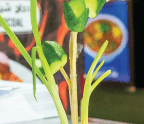Staff Picks: Hauntings, Hollywood, and Home
My favorite genre of novel is one I like to call “women interacting with art.” Membership is somewhat limited but disproportionately loved. On this shelf sits works such as A. S. Byatt’s , Ali Smith’s , and now María Gainza’s . Although each book is unique, they employ a similar philosophy: a belief that life becomes entangled with the art we touch. Gainza’s novel, translated from the Spanish by Thomas Bunstead, follows an Argentine woman alongside her beloved works of art, contrasting her memories with the history of her favorite paintings. Falling somewhere between essay and close personal narrative, reads like a museum. It encompasses countless styles, eras, and characters, offering new stories and ideas for our narrator to follow down winding hallways. Considering artist legacies, Argentine culture, and the accuracy of perception, Gainza paints life and art as adjacent forces; fabricated images and stories become real, casting their shadows onto memory. At one point, Gainza describes the narrator’s childhood home filled with antique furniture, and the bathroom with “a pile of Sotheby’s catalogues dating back to 1972, the shelves bowed under their weight.” The image serves as an unlikely metaphor for Gainza’s book: built around everyday life but haunted by a history of art stacked high in the corner, quietly shaping the space where it sits.
You’re reading a preview, subscribe to read more.
Start your free 30 days


